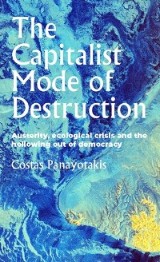Details

The capitalist mode of destruction
Austerity, ecological crisis and the hollowing out of democracyGeopolitical Economy
|
35,99 € |
|
| Verlag: | Manchester University Press |
| Format: | EPUB |
| Veröffentl.: | 09.02.2021 |
| ISBN/EAN: | 9781526144539 |
| Sprache: | englisch |
| Anzahl Seiten: | 224 |
DRM-geschütztes eBook, Sie benötigen z.B. Adobe Digital Editions und eine Adobe ID zum Lesen.
Beschreibungen
<i>The capitalist mode of destruction</i> traces contemporary capitalism’s economic, ecological and democratic crises. Combining insights from a range of disciplines, including psychology, sociology and political economy, Panayotakis interprets these crises as manifestations of a previously unrecognized contradiction: over time, the benefits of capitalism’s technological dynamism tend to decline even as its threats to humanity and the planet continue to mount. To explain this contradiction, the book analyzes the production and distribution of surplus in capitalist societies and rethinks the concept of surplus itself. Identifying the public sector and households as sites of production no less important than the workplace, this book attributes capitalism’s contradictions to working people’s lack of control over the surplus they produce. This lack of control is undemocratic and threatens the planet. Only a classless society, in which working people democratically determine the size and use of the surplus they produce, can effectively respond to our current predicament. Recognizing such a democratic classless society as the essence of the communist ideal, the book argues that, far from becoming obsolete, this ideal is ever more indispensable. But since the necessity of this ideal does not guarantee its realization, the book also investigates the conditions necessary for the formation of an anti-capitalist alliance for social justice, democracy and ecological sustainability.
This book investigates capitalism’s mounting destructiveness. Tracing today’s economic, ecological and democratic crises to capitalism’s undemocratic use of the surplus, Panayotakis highlights the necessity of a democratic classless society, which would restore control of the surplus to those who produce it.
Confronting the capitalist virus: A prefatory note
Introduction
1 Rethinking the Surplus
2 Surplus and Freedom
3 Capital’s Real Subsumption of Consumption
4 Consumerism and Capital’s Use of Science and Technology to Undercut Democracy
5 Capitalism as a Force of Destruction
6 Futile Growth and Mounting Destruction: The Need to Rethink Contemporary Capitalism’s Contradictions
7 The Crisis of Capitalist Democracy and the Continuing Relevance of the Communist Ideal
Conclusion: Rethinking the Relationship Between Capitalism, Communism and Democracy
Introduction
1 Rethinking the Surplus
2 Surplus and Freedom
3 Capital’s Real Subsumption of Consumption
4 Consumerism and Capital’s Use of Science and Technology to Undercut Democracy
5 Capitalism as a Force of Destruction
6 Futile Growth and Mounting Destruction: The Need to Rethink Contemporary Capitalism’s Contradictions
7 The Crisis of Capitalist Democracy and the Continuing Relevance of the Communist Ideal
Conclusion: Rethinking the Relationship Between Capitalism, Communism and Democracy
Costas Panayotakis is Professor of Sociology at the New York City College of Technology at the City University of New York
<i>The capitalist mode of destruction</i> traces contemporary capitalism’s economic, ecological and democratic crises. Combining insights from a range of disciplines, including psychology, sociology and political economy, Panayotakis interprets these crises as manifestations of a previously unrecognized contradiction: over time, the benefits of capitalism’s technological dynamism tend to decline even as its threats to humanity and the planet continue to mount. To explain this contradiction, the book analyzes the production and distribution of surplus in capitalist societies and rethinks the concept of surplus itself. Identifying the public sector and households as sites of production no less important than the workplace, this book attributes capitalism’s contradictions to working people’s lack of control over the surplus they produce. This lack of control is undemocratic and threatens the planet. Only a classless society, in which working people democratically determine the size and use of the surplus they produce, can effectively respond to our current predicament. Recognizing such a democratic classless society as the essence of the communist ideal, the book argues that, far from becoming obsolete, this ideal is ever more indispensable. But since the necessity of this ideal does not guarantee its realization, the book also investigates the conditions necessary for the formation of an anti-capitalist alliance for social justice, democracy and ecological sustainability.


















